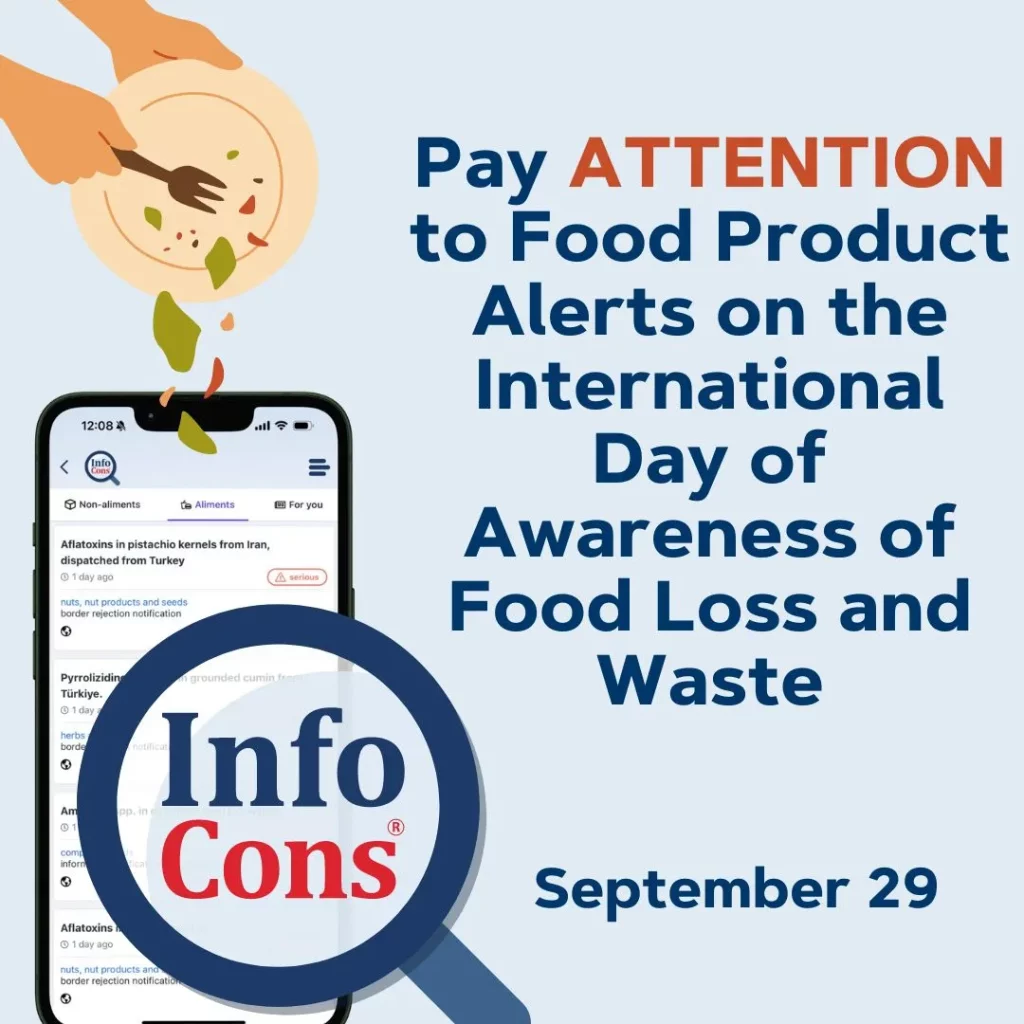
On September 29 each year, the International Day of Awareness of Food Loss and Waste is observed. Marking the fifth anniversary of the event, this year’s focus is on the urgent need for financial investments to support efforts to reduce food loss and waste, meet climate goals, and advance the 2030 Agenda for Sustainable Development.
On this occasion, InfoCons offers consumers the European InfoCons App, a useful tool for making informed choices regarding food products. With the free European InfoCons App, consumers can check if the products they purchase comply with safety standards. In the app’s Alerts section, users have direct access to alerts on food and non-food products at the European Union level.
Read also : What to Do If You Are a Victim of Bank Account Theft
Through the Alerts section of the European InfoCons App, consumers have transparent, daily updated access to food alerts, accompanied by details such as:
- The date the alert was issued (from the most recent to the oldest);
- A detailed description of the product ;
- Countries affected;
- The problem identified with the product;
- The risk level.
The European InfoCons App is a free and useful tool available in 33 languages. It allows consumers to make their own decisions about what they eat by simply scanning a product’s barcode. Through this app, anyone can access important information such as:
- Scanning food product barcodes to find out the ingredients, number and type of additives, allergens, sugar, salt, and calorie content;
- Customizing the app for those with specific health or dietary needs by setting the amounts of salt, sugar, allergens, and additives to be tracked;
- A calculator where users can input the quantity of food consumed to instantly see the amount of salt, sugar, and calories, as well as the physical activities needed to burn those calories (walking, running, cycling);
- Saving scanned products in the “Saved Products” section, allowing consumers to create their shopping list, daily/weekly menu, or recipes;
- Viewing the total number of additives and the total sugar and salt content of consumed products in the “Saved Products” section;
- Real-time alerts for food and non-food products at the European Union level;
- A terminology dictionary covering consumer protection, environment, financial, labor, insurance, energy, and other topics.
Read also : What is the European Health Insurance Card and When Can It Be Used?
9 Tips for Reducing Food Waste!
- Shop smart and buy in moderate quantities!
- Avoid shopping when you’re hungry;
- Think carefully before taking advantage of “2 for the price of 1” deals.
- Get creative with food leftovers!
- Turn stale bread into delicious croutons;
- Vegetable scraps can be used to make vegetable stock;
- Unused parts of fish can be perfect for making a concentrated soup.
- Check what you have at home and plan your meals accordingly!
- Choose fruits and vegetables that don’t look perfect!
- Many fruits and vegetables are discarded due to their shape, size, or color, but they are just as nutritious and tasty.
- Plan your portions correctly!
- Cereals and other foods expand when cooked;
- Use your palm, fist, or hand cup to measure appropriate portions of meat, fish, or vegetables.
Read also : Why is it recommended to frequently test for hepatitis?
- Pay attention to how you store food !
- Use glass or stainless steel containers for food storage;
- Avoid storing fruits and vegetables in sealed plastic bags;
- Use labels to mark products in the freezer.
- Read labels and understand the difference between “Best before…” and “Use by…” dates!
- 40% of Europeans are confused about expiration dates;
- “Use by…” applies to perishable products like meat, fish, and ready-to-eat salads;
- “Best before…” applies to frozen, dried, or canned products.
- Turn food scraps into compost!
- About 40% of household food scraps can be compostable;
- Homemade compost is perfect for your balcony plants.
- Share leftover food with others!
The United Nations General Assembly designated September 29 as the International Day of Awareness of Food Loss and Waste (IDAFLW), with the Food and Agriculture Organization (FAO) and the United Nations Environment Programme (UNEP) co-organizing the day. These two organizations collaborate to lead activities that highlight the importance of addressing food loss and waste, while encouraging global action to tackle the issue. The initiative aligns with Sustainable Development Goal Target 12.3, which aims to halve global per capita food waste at retail and consumer levels by 2030 and to reduce food losses across production and supply chains.
Read also : Border Security – ETIAS Requirements for Visa-Free Travel to the European Union
Considering the enormous resources used for food production, such as land, water, and energy, the inefficiencies caused by food waste are significant. In 2021, 13.2% of globally produced food was estimated to be lost after harvest, while in 2022, 19% of food available to consumers was wasted at retail, food service, and household levels.
Food loss and waste not only impact producers but also consumers, economies, and livelihoods. Furthermore, they account for 8 to 10% of total emissions in the agrifood systems, contributing significantly to climate change, with methane from food waste being 28 times more harmful than carbon dioxide. Addressing food loss throughout the supply chain would improve the efficiency of the food system and ensure that more food reaches those in need.
Reducing food loss and waste is crucial for improving food security, promoting efficient resource use, protecting the environment, and mitigating climate change. However, achieving this will require greater access to climate finance.
Source : UNEP – UN Environment Programme